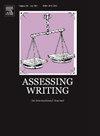了解第二语言学生作家在语言支持的同伴反馈中的批判性思维体验
IF 5.5
1区 文学
Q1 EDUCATION & EDUCATIONAL RESEARCH
引用次数: 0
摘要
研究调查了第二语言(L2)学生作家的同伴反馈(PFG)以及PFG对学生批判性思维的影响,即他们对写作内容的批判性参与。然而,使用PFG来支持学生的批判性思维往往受到将批判性思维视为纯粹认知过程的方法的限制,使得批判性思维无法作为学生的实践。为了解决这一差距,本研究在中国一所大学的写作课程中进行了定性研究,探讨了系统功能语言学(SFL)支持的第二语言学生作家在PFG期间的批判性思维过程。本研究旨在表明sfl支持的PFG是否以及如何提供一个语言上可访问的门户,通过该门户,学生作家可以在二语写作的背景下练习批判性思维。现有研究表明,PFG在支持学生作家批判性思维方面的潜力,以及外语在构建和解构语篇内容时透明地突出语言资源(词汇和语法)的研究,都证明了这一探索的合理性。数据来源包括对学生的采访,学生PFG的书面记录,以及他们对PFG的书面反思。定性分析表明,在外语知识的支持下,学生评价者逐渐发展了理解语言资源的能力,这是解开写作内容意义构成的一个可访问的门户。这些知识使他们能够通过在反馈会议上分析和评估同龄人写作中意义构建的微妙之处来练习批判性思维,并将从PFG中获得的收获与自己的写作联系起来。然而,我们注意到,在这个过程中练习批判性思维对PFG过程中的学生内部和学生外部因素(例如,外语知识不足,教师支持)很敏感。本研究得出的结论是,总体而言,在PFG的支持下,参与SFL为学生评估者提供了一个在二语写作背景下练习和发展批判性思维的渠道。本文章由计算机程序翻译,如有差异,请以英文原文为准。
Understanding the critical thinking experiences of L2 student writers engaged in linguistically supported peer feedback giving
Research has examined second-language (L2) student writers’ peer feedback giving (PFG) and the impact that PFG has on students’ critical thinking, namely their critical engagement with writing content. However, the use of PFG to support students’ critical thinking has often been limited by approaches that treat critical thinking as a purely cognitive process, making critical thinking inaccessible as a practice for students. To address this gap, this qualitative study, conducted in a writing course at a Chinese university, explores L2 student writers’ critical thinking processes during PFG, which was supported by systemic functional linguistics (SFL). The study aims to show whether and how SFL-supported PFG could provide a linguistically accessible gateway through which student writers can practice critical thinking in the context of L2 writing. This exploration is justified by existing research on the potential of PFG in supporting student writers’ critical thinking and research on SFL in transparently highlighting language resources (lexicon and grammar) in constructing and deconstructing the content of discourse. Data sources included interviews with students, a written record of the students’ PFG, and their written reflections on PFG. Qualitative analyses reveal that with the support of SFL knowledge, student evaluators gradually developed the ability to understand language resources as an accessible gateway to unpacking the meaning making of writing content. The knowledge enabled them to practice critical thinking by analyzing and evaluating the subtleties of meaning making in their peers’ writing during feedback sessions, and connecting gains from PFG to their own writing. However, it was noted that practicing critical thinking in this process was sensitive to student-internal and student-external factors in the process of PFG (e.g., insufficient knowledge of SFL, teacher support). This study concluded that overall, engaging in SFL supported by PFG provided student evaluators with an accessible channel for practicing and developing critical thinking in the context of L2 writing.
求助全文
通过发布文献求助,成功后即可免费获取论文全文。
去求助
来源期刊

Assessing Writing
Multiple-
CiteScore
6.00
自引率
17.90%
发文量
67
期刊介绍:
Assessing Writing is a refereed international journal providing a forum for ideas, research and practice on the assessment of written language. Assessing Writing publishes articles, book reviews, conference reports, and academic exchanges concerning writing assessments of all kinds, including traditional (direct and standardised forms of) testing of writing, alternative performance assessments (such as portfolios), workplace sampling and classroom assessment. The journal focuses on all stages of the writing assessment process, including needs evaluation, assessment creation, implementation, and validation, and test development.
 求助内容:
求助内容: 应助结果提醒方式:
应助结果提醒方式:


